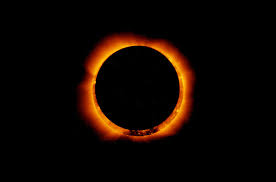Don Lincoln
On Saturday morning, a dragon will eat the sun. If you’re able, you should go outside and see it; it’ll be a dazzling spectacle. Such poetic descriptions of solar eclipses can be seen in some of the earliest astronomical records, penned by Chinese astronomers over 4,000 years ago. In order to scare away the dragon and restore the normal order of things, people would bang pans and shout loudly. And it always worked. The dragon let go of the sun and light returned.
Our modern understanding of the phenomenon of solar eclipses is more mechanical, involving the motion of the moon, but even today, an eclipse is a breathtaking experience. But, more than that, it’s a human experience, one in which people across the world and across time can share a moment of cosmic wonder. I saw my first solar eclipse on a school playground. It was winter, and kids were making snowmen, sliding down the hill and enjoying the cold air. The sky was absolutely perfect to view an eclipse. It was one of those overcast days with a thin layer of clouds that allows just enough light through so you can view the sun without squinting.
The sun was a pale silver disk, surrounded by a light gray sky. As the moon began to pass in front of the sun, children stopped to watch. Recess was extended that day, as the moon steadily blocked the sun, until all that was left of the sun was a silver crescent. Teachers and students alike joined together to enjoy the view.
That first eclipse was only a partial one and it was many years before I saw a full one. Indeed, the first full solar eclipse I saw took place in 2017. I had booked the hotel a full year before. The location I selected was in southern Illinois, close to the where I’d be able to experience the maximum duration of the eclipse and also close to the intersection of major highways so I could quickly relocate, in the event a cloudy sky threatened my plans. But I was lucky.
The sky was cloudless, and I stood in the hotel parking lot, watching as the moon covered the sun. As the eclipse began, I looked upward through dark glasses. And then, the moment of totality arrived, and I removed my protective eyewear. For a little over two and a half minutes, I took in my first full eclipse, seeing the darkened sun, the solar corona and the eerie color of the rest of the sky. In that moment I wasn’t a scientist. I was just a person entranced by the astronomical display. I imagined what it must have been like for ancient people who had no understanding of celestial mechanics to see the sun disappear. It had to have been a mixture of fear and religious awe.
And, for the record, I did bang a pot just for good measure. The dragon was scared away. You’re welcome. On Saturday, another eclipse will be visible across a large part of the country, beginning along the Oregon coast and moving through Texas before passing over parts of Central and South America. This will be a unique event. Rather than a full eclipse, in which the sun is totally blocked, it will be an annular eclipse. At the moment of maximum coverage, a thin ring of sunlight will encircle the moon – a “ring of fire” in the sky. Annular eclipses occur when the moon is farthest (or almost farthest) from the Earth. Because it is more distant, it appears smaller, and thus doesn’t quite block the entire sun. But even that thin outer circle of sunlight is very bright, which means you must be careful when you view the event.
If you are one of the lucky people who lives under the path of maximum coverage, you should definitely go outside and look up. But even for those of you who live in places where the coverage of the moon will be only partial, it’s still worth your time to take in the sight. Unless you’re an eclipse chaser, you will only see a handful of eclipses in your lifetime. Be sure to see this one. As fascinating as this eclipse will be, Americans have another celestial event to look forward to. On April 8, 2024, a total eclipse will begin in the southern Pacific and then pass through Mexico and across the United States, beginning in Texas before heading towards Detroit and then over Montreal and out over the North Atlantic. I’ve already booked my hotel under the path of totality, again located at the crossroads of highways in case of unlucky cloud cover. We live in a constant ebb and flow of work and family, chores and responsibilities. However, there are certain events that are worth pausing for a moment to just take in and enjoy. I hope that you, like millions of others before you, will stop what you’re doing and turn your eyes to the sky. You won’t be sorry.
CNN







